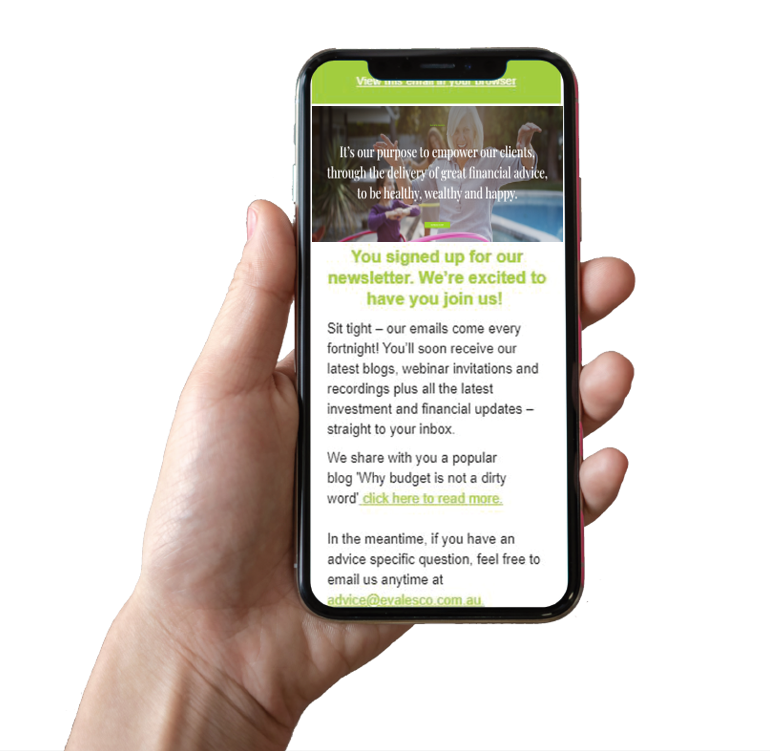Schedule a Chat
Contact Info
Suite 17.03, Level 17
20 Bond Street
Sydney NSW 2000

INSIGHTS WITH EVALESCO
TOPICS DISCUSSED
The silly season can be a time of fun and frivolity, but it can also take its toll on our mental health. Spending time with or without family and friends, financial stresses, packed calendars and long to-do lists might seem overwhelming, and more stressful than day-to-day life.
Follow these tips to help you take care of your mental wellbeing throughout the holidays.
Recognise stress
Ongoing stress or anxiety isn’t normal, even if it seems like everyone around you is a little bit on edge at Christmas time. Stress can manifest itself in lots of different ways; from feeling moody or irritable, to having trouble sleeping, loss of appetite, or getting upset or hurt feelings easily.
If you catch yourself starting to feel stressed, you can try techniques like relaxation, taking a break to do something you enjoy, writing down all the things you have to do, or doing some exercise to help you find some calm.
You think what you eat
We’ve all seen a kid hyped up on sugar, and the tantrum-filled ‘come down’, but as adults we often forget that what we’re eating might impact how we’re feeling mentally. Your diet and your mental health are linked, with researchers finding that food not only has an impact on our mental health when we eat it, but it can alter our gut bacteria, which can affect mood, too.
Before you indulge in heaps of sugary or processed food over the holidays, think about how they might make you feel afterwards. If you’re looking for healthy alternatives, check out some party food recipes on the Healthier. Happier. Site.
Understand how alcohol affects you
As your body gets alcohol out of your system, your blood sugar levels drop, which actually stresses your brain out. This can lead to feelings of anxiousness and worry, and can be especially concerning if you have an anxiety disorder.
Lots of people drink to relax or in an attempt to rid themselves of worries or anxiety for a few hours, but if this comes with a hefty dose of anxiousness, you might need to rethink this coping mechanism.
Take a day off
The silly season can sometimes feel like everything is ‘go, go, go’ with no ‘stop’ in sight. But you don’t have to do every activity or go to every party if you’re not feeling up to it. Take a ‘mental health day’ (or afternoon, or hour) and excuse yourself from the fray for some good quality you time.
See a professional
It can be easy to talk yourself out of getting help for your mental wellbeing. But if you’ve been not feeling ‘yourself’ – which could be feeling angry, sad, stressed or irritable – for two weeks or more, it’s time to talk to a professional about it. Book an appointment with your GP, call 13 43 25 84 for 24-hour confidential health advice, or find a mental health service in your area. Always call Triple Zero (000) if you think it’s an emergency.
Look out for your mates
Holidays, Christmas and the New Year can also be stressful for those around us. If you’re worried about someone, we’ve written this guide to speaking with a mate about mental health, or call Triple Zero (000) if you think it’s an emergency.
Source
(1) www.health.gld.gov.au
SHARE OUR INSIGHTS
Share on Facebook
Share on Email
Share on Linkedin

NEWSLETTER

Evalesco Financial Services Level 17, 20 Bond Street Sydney NSW 2000
Phone: (02) 9232 6800
The information provided on and made available through this website does not constitute financial product advice. The information is of a general nature only and does not take into account your individual objectives, financial situation or needs. It should not be used, relied upon, or treated as a substitute for specific professional advice. We recommend that you obtain your own independent professional advice before making any decision in relation to your particular requirements or circumstances. Evalesco Financial Services do not warrant the accuracy, completeness or currency of the information provided on and made available through this website. Past performance of any product discussed on this website is not indicative of future performance. Copyright © 2019 Evalesco Financial Services. All rights reserved